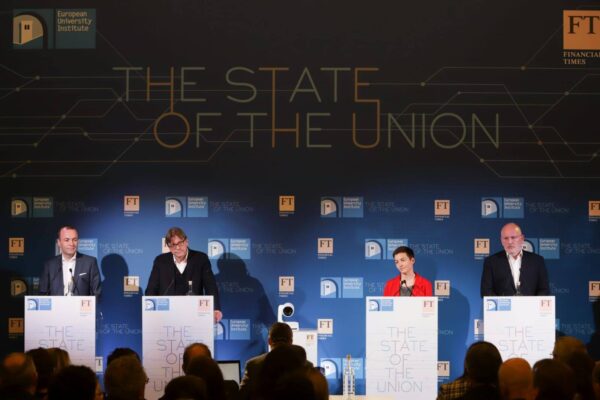
Just days before the European Parliament elections, the lead candidates for President of the European Commission from the major European political parties – also known as spitzenkandidaten – came together to discuss their vision for the Future of Europe.
The Maastricht Debate
On 29 April, Bas Eickhout (European Greens), Frans Timmermans (European Socialists), Violeta Tomić (European Lefts), Guy Verhofstadt (Alliance of Liberals and Democrats for Europe) and Jan Zahradil (Alliance of Conservatives and Reformists in Europe) met to outline their parties’ priorities for the next legislative period. Manfred Weber (European People’s Party) was not present. The debate focused on three themes: Digital Europe, Sustainable Europe and Future Europe.
The main message that came across during the debate on Digital Europe was the need to regulate and tax tech giants such as Facebook, Google and Amazon. The majority of candidates agreed that this power needs to be given to the European Union, while Jan Zahradil argued taxation is a matter of national competence.
In the debate on a Sustainable Europe, all candidates besides Jan Zahradil expressed their support for the school climate strikers. While most candidates were supportive of ambitious climate goals, Jan Zahradil argued not all countries are ready for a rapid energy transition and acting too fast risks damaging the economy and raising poverty levels across Europe.
In the debate on Future Europe all candidates committed to creating a gender-equal cabinet of Commissioners. While most candidates agreed on the need for the EU to build a strong European Pillar of Social Rights, including a minimum social security net, minimum income and minimum wages, Jan Zahradil again highlighted the need to defend national competences.
According to live polls on Slido, Frans Timmermans was the clear winner of the debate (42%), followed by Bas Eickhout (36%), Guy Verhofstadt (9%), Jan Zahradil (7%) and Violeta Tomić (5%).
If you have not yet had the chance to watch the debate, you can do so here.
The Florence Debate
Just a few days later, on 2 May, candidates representing the four leading pro-European parties met again on the fringe of the State of the Union in Florence. Represented by Ska Keller (European Greens), Frans Timmermans (European Socialists), Guy Verhofstadt (Alliance of Liberals and Democrats for Europe) and Manfred Weber (European People’s Party), the lead candidates for European Commission President debated on the following themes: migration, social & economic policy, climate change & sustainability, and foreign policy & security.
Some takeaways:
- Guy Verhofstadt announced the plans of his political party ALDE to resolve after the election, to form a new centre political family with Emmanuel Macron.
- All candidates seemed to be in favour of more power for the European Commission and the European Parliament, and less power for the European Council, including the right for the European Parliament to propose legislation.
- Candidates clashed over a the idea of a European Army (Guy Verhofstadt & Manfred Weber in favour, Frans Timmermans & Ska Keller against).
If you have not yet had the chance to watch the debate, you can do so here.
